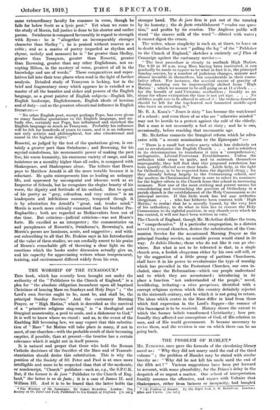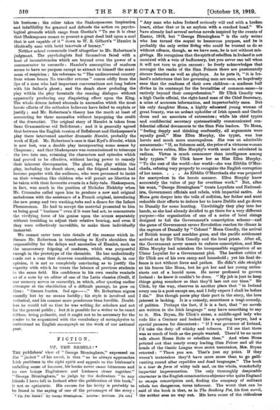THE PROBLEM OF HAMLET.* Mn. ZaNawrer. once gave the formula
of the circulating-library novel as : " Why they did not marry until the end of the third volume " ; the problem of Hamlet may be stated with similar brevity as : " Why did he not kill his uncle until the end of the fifth act ? " Various suggestions have been put forward to account, with some plausibility, for the Prince's delay in tho despatch of so urgent a matter. One school of interpretation frankly assumes the offensive, and argues with Voltaire that Shakespeare, either from laziness or incapacity, had bungled
• the Prottem of Hamlet. By the Right Sloe. J. M. Robertson. London: Allen and Unwin. [5s. net.J
his business ; the other takes the Shakespearean inspiration and infallibility for granted and defends the action on psycho. logical grounds which range from Goethe's " To me it is clear that Shakespeare meant to present a groat deed laid upon a soul that is not capable of it" down to W. S. Gilbert's "Hamlet Is idiotically sane with lucid intervals of lunacy."
Neither school commends itself altogether to Mr. Robertson's judgment. The psychologists find themselves faced with a host of inconsistencies which are beyond even the power of a commentator to reconcile : Hamlet's assumption of madness seems to have no purpose except to attract to himself the maximum of suspicion ; his reference to " The undiscovered country from whose bourn No traveller returns " comes oddly from the lips of a man who had important conversations not long before with his father's ghost ; and the dumb show preluding the play within the play forestalls the ensuing dialogue without apparently producing any disquieting effect upon the King. The whole drama indeed abounds in anomalies which the most heroic efforts of the orthodox believers have failed to explain or justify ; and Mr. Robertson's theory has the merit at least of accounting for these anomalies without impugning the credit of the dramatist. The original story of Hamlet is taken from Saxo Grammaticus rid Belleforest ; and it is generally agreed that between the English version of Belleforest and Shakespeare's play there intervened another dramatic Hamlet, probably the work of Kyd. Mr. Robertson's case is that Kyd's Hamlet, which is now lost, was a double play incorporating some scenes by Chapman ; and that Shakespeare was commissioned to telescope the two into one, retaining the characters and episodes which had proved to be effective, without having power to remedy their inherent discrepancies. The ghost, the play within the play, including tho dumb show, and the feigned madness had become popular with the audience, who were presumed to insist on their retention like children who will permit no liberties to be taken with their favourite events in a fairy-tale. Shakespeare, in fact, was much in the position of Nicholas Nickleby when Mr. Crummles called upon him to produce a new and original melodrama with the assistance of a French original, introducing the new pump and two washing-tubs and a dance for the Infant Phenomenon. He had to accept the material presented to him as being good " business " even if it were bad art, to concentrate the vivifying force of his genius upon the scenes separately without troubling to adjust their relative bearing, and even if they were collectively incredible, to make them individually immortal.
We cannot enter here into details of the reasons which influence Mr. Robertson in transferring to Kyd's shoulders the responsibility for the delays and anomalies of Hamlet, such as the unnecessary feigning of madness, which was purposeful enough in the prototype of the chronicle. He has undoubtedly made out a case that deserves consideration, although, in our opinion, it is not so completely convincing as to justify the asperity with whisk he treats the labours of previous students in the same field. His confidence in his own results reminds es of a note by an editor of one of the Latin classics (Orelli, if our memory serves us correctly), in which, after quoting earlier attempt:4 at the elucidation of a difficult passage, he goes on thus : " Omnes frustra. Sed ego--." Mr. Robertson argues soundly but by no means lucidly ; his style is involved and technical, and his manner more ponderous than forcible. Doubtless he would tell us that he was writing for scholars and not for the general public ; but it is possible for a writer to be exact without being pedantic, and it ought not to be necessary for the reader to be acquainted with the vocabulary of metaphysics to understand an English monograph on the work of our national poet.







































 Previous page
Previous page